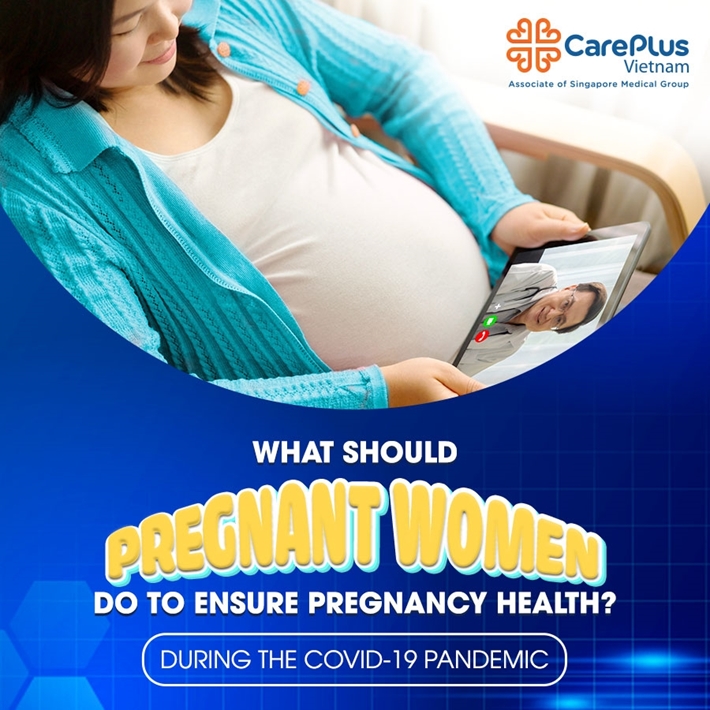What should pregnant women do to ensure pregnancy health during the COVID-19 pandemic?
In the context of the ongoing COVID-19 epidemic, pregnant women need to know how to protect their health and their unborn baby.

8/18/2021 10:40:42 AM
Six things pregnant women need to do to ensure their health during the COVID-19 pandemic
Advice from Assoc. Prof. Vuong Thi Ngoc Lan - Dean of Faculty of Medicine, University of Medicine and Pharmacy, Ho Chi Minh City, Head of Obstetrics and Gynecology Department
- Maintain wellness appointments during and after pregnancy. Luan complying 5K CZK
- When there are danger signs: Immediately notify the obstetrician or go to a medical facility with maternity care function. Luan complying 5K CZK
- If symptoms of fever, cough, shortness of breath, chest tightness appear: Immediately notify the local health facility for timely advice and support.
- Talk to your obstetrician about your wishes for delivery.
- Vaccinate against COVID-19 according to current regulations of the Ministry of Health of Vietnam.
- In the case of COVID-19: pregnant women should not panic but should adhere to the treatment of COVID-19 according to the regimen prescribed by the doctor.
Answers to frequently asked questions about the COVID-19 vaccine for pregnant women
Question 1: What is the risk of COVID-19 infection for pregnant women? And what role does the vaccine play for pregnant women?
Pregnant women with COVID-19 are at increased risk for the following:
- severe respiratory failure
- risk of resuscitation
- must use ECMO
Risk of complications in pregnancy with COVID-19:
- preeclampsia
- premature birth
- intrauterine growth retardation
- Caesarean section instead of giving birth
Therefore, pregnant women should prioritize vaccination to protect the health of women, fetuses, and the community. Breastfeeding women can receive the COVID-19 vaccine, and antibodies can be produced through breast milk, thereby protecting the baby.
Question 2: According to research in the world, how does vaccination for pregnant women take place?
Studies around the world show that pregnant women can vaccinate like ordinary people. There has been no increased risk of problems for the woman or fetus compared with a woman who is not pregnant. According to Decision 3802/QD-BYT of the Ministry of Health of Vietnam, pregnant women from 13 weeks or more need to be vaccinated at medical facilities with conditions for an obstetric emergency to ensure mother and fetus pediatric safety.
Question 3: Some women are still apprehensive about how vaccination may affect their pregnancy, health, and unborn babies. Doctor's advice for pregnant women?
- The COVID-19 vaccine has been used worldwide since December 2020, less than one year so far. Therefore, there are not enough data to assess long-term safety.
- So far, according to the US Centers for Disease Control and Prevention, data recorded on more than 130,000 pregnant women at the time of vaccination with COVID-19 vaccine have not detected side effects, complications, and What are the special effects of the COVID-19 vaccine on pregnant women? Therefore, pregnant women need to be thoroughly counseled, evaluated the benefits and risks to decide to vaccinate.
- Countries around the world now recommend vaccination for pregnant women, especially in areas with solid outbreaks.
- In addition to assessing and monitoring pregnancy, pregnant women receiving the vaccine are also monitored after vaccination like other cases. According to the guidance of the Ministry of Health of Vietnam signed on August 10, 2021, vaccination against COVID-19 carries out for pregnant women from 13 weeks or more. Pregnant and lactating women contraindicate to receive the Sputnik V vaccine. When vaccinated, pregnant and lactating women will be screened to ensure vaccination safety.
Question 4: Is the SARS-CoV-2 virus transmitted from mother to child during pregnancy?
There is currently no evidence of the possibility of mother-to-child transmission of SARS-CoV-2 during pregnancy. At the same time, there is no evidence that maternal viral infection during pregnancy can cause congenital disabilities, and there is no evidence of an association between SARS-CoV-2 infection and miscarriage.
To date, no evidence has found that the virus is active in amniotic fluid or breast milk.